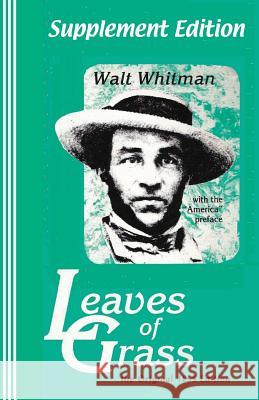Supplement Edition: Leaves of Grass: The Original 1855 Edition » książka
Supplement Edition: Leaves of Grass: The Original 1855 Edition
ISBN-13: 9780942208375 / Angielski / Miękka / 2011 / 238 str.
The Supplement Edition of Leaves of Grass includes the text, a supplement section of typical questions, such as What did the first readers say? What were Whitman's influences?, plus a bibliography of Whitman's own work and critics of his work, glossary for terms not in modern use. Also appended is the last statement that Whitman made about the writing of Leaves of Grass, called A Backward Glance Over Traveled Roads (1888). 246pp. For an interactive pdf version, go to www.bandannabooks.com/ebooks/leavessuppeb.php The original edition of Leaves of Grass had just 95 pages of poetry, and a lengthy introduction. The only titles were "Leaves of Grass" or a marker, indicating a new poem. The original book listed no author, with a small engraving of himself in a loose open shirt and tipped hat, one hand on hip, the other in his pocket (to "loafe" at that time meant to be seen idling stylishly about town). The engraving by Samuel Hollyer was based on a photo by Gabriel Harrison (a common printing conversion by skilled professionals in the pre-digital age). Whitman's experience as editor of the Brooklyn Eagle observing the American scene and his patroitic bombast of, for example, the "America" essay that opens this book, led him to use the longest breath-line in poetry until Allen Ginsberg and Bob Dylan. This poetic line allowed him to speak as a visionary poet of Biblical stature with remark-able candor, and he continues to stand at the center of American literature a hundred years after his death. Why should we read the first edition, long before the famous Lincoln and Civil War poetry? This edition shows the freshness of Whitman's creative breakthrough-for the first time he finds/invents an appropriate form, and he gets a handle on his true subject. This book marks his emergence from the wilderness. Whitman himself designed the book and set the type for the first edition. He set no poem titles other than the phrase "Leaves of Grass," placed at the heads of major sections, and we follow that design. This edition retains the universal "he," which Whitman uses liberally throughout.











